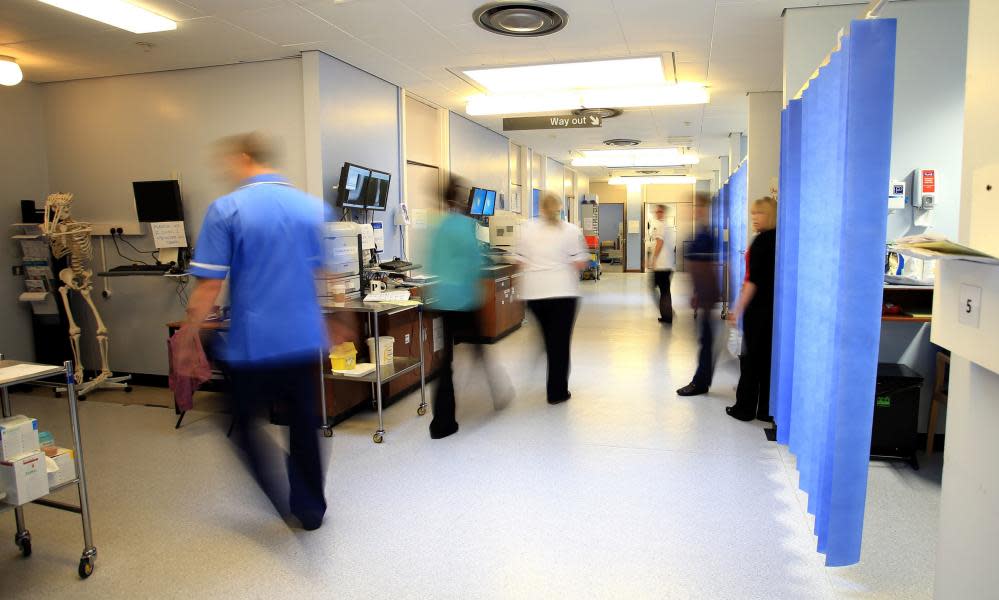Essex hospital pulls gas and air for pregnant women amid concerns for staff

A hospital in Harlow has withdrawn painkilling gas and air for women because of the air quality of its maternity unit after high levels of nitrous oxide were found.
The Princess Alexandra hospital in Essex is the latest to withdraw the treatment. The Health and Safety Executive is already investigating Basildon hospital amid concerns over staff exposure to high levels of nitrous oxide used in Entonox.
While Entonox gas and air is considered safe for pregnant women and their babies, exposure to high levels of the gas over longer periods could pose a health risk for staff.
Dr Alex Field, divisional director, consultant obstetrician and gynaecologist, at the Princess Alexandra Hospital NHS trust, said: “We have temporarily suspended the use of Entonox across the maternity unit to protect our midwifery and medical team.”
The trust has ordered mobile ventilation units to remove the nitrous oxide and hopes to be able to start offering pregnant women gas and air as soon as possible. “There are no risks to people attending, staying or visiting the hospital,” he added.
The NHS trust is the latest to conduct environmental audits of its maternity suites after Basildon hospital, run by Mid and South Essex NHS foundation trust, temporarily stopped using the gas in December 2022, while new ventilation units were installed.
A spokesperson for the Royal College of Midwives said: “We have been approached by midwife members who have suffered a variety of symptoms they attribute to exposure to Entonox [gas and air]. Basildon hospital investigations have revealed the exposure levels in the maternity departments were over the legal limit. We are investigating these issues with our lawyers to support our members in potential claims; and have reported the issues to the HSE who are also carrying out their own investigation.”
A spokesperson for HSE said: “We are investigating the levels of nitrous oxide following concerns raised by staff. The higher levels were identified by the Mid and South Essex University trust during their own air sampling.”
Employers are required to protect workers from exposure to hazardous substances in the workplace, to conduct risk assessments and to put control measures in place to adequately control exposure. The limit of 100ppm for nitrous oxide had been in place since 1996, the spokesperson added.
A spokesperson for Mid and South Essex NHS Foundation Trust said: “We have followed all of the expert advice provided to us to deal with the issue of nitrous oxide in the air at our maternity unit at Basildon hospital.
“Significant improvements have been made and it is perfectly safe for service users and their families to continue to use the maternity unit as normal. We have taken action to resolve the situation and an investigation is under way.
“Support and advice is being offered to our staff. Mitigations have been put in place, based on clinical recommendations, and we are continuing to keep our staff informed.”
Ipswich hospital has also stopped offering gas and air following an environmental audit that found levels of nitrous oxide in some delivery areas were higher than national guidelines.
Dr Giles Thorpe, the chief nurse at East Suffolk and North Essex NHS foundation trust, which runs Ipswich hospital said: “We completely understand the concerns of women and pregnant people who would like a hospital birth with the option of using gas and air (nitrous oxide). Until there is a safe and effective solution, we are unable to reintroduce gas and air to ensure we keep our maternity team safe.”
Val Willcox, practice and quality manager at the childbirth charity NCT, said: “Women who are due to give birth at hospitals that have suspended Entonox may be concerned about how this may affect them. There are no long-term health risks to labouring women who use Entonox. We would encourage women who wish to use Entonox to speak to their midwife or hospital trust about alternative pain relief options or consider transferring their care to another hospital.”

 Yahoo News
Yahoo News 
